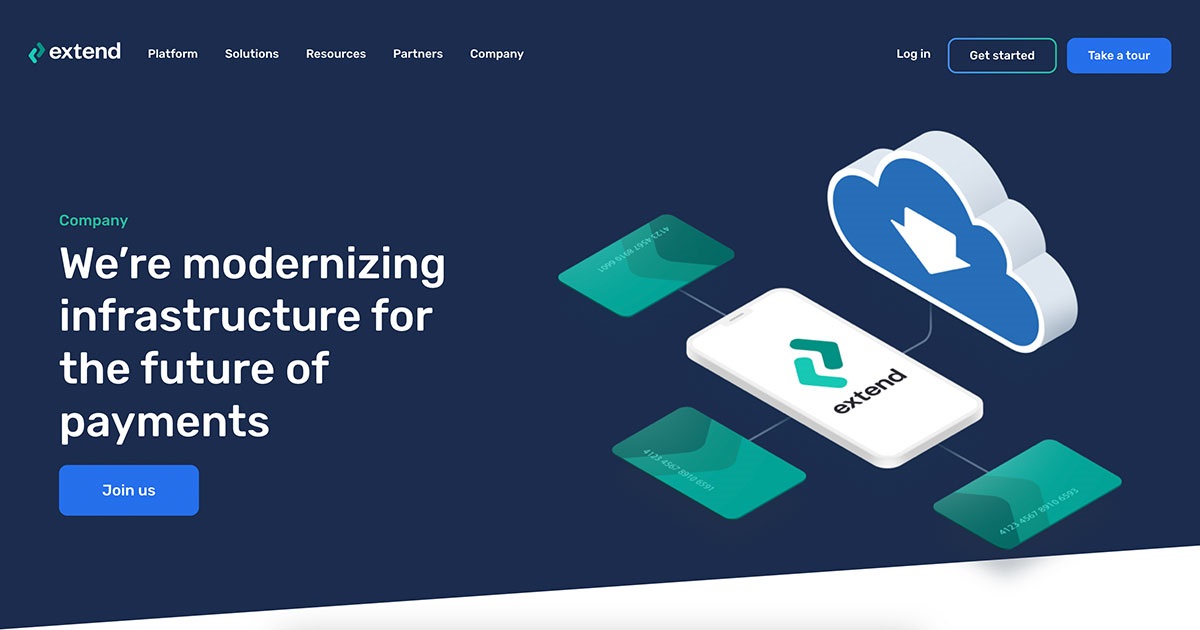From Corporate Employee to Managing Corporate Spending
The Origin Story of Extend

Last Updated: By TRUiC Team
Properly managing how employees spend money with company credit cards can be a challenge. Employees need to fill out expense reports that management has to review, which isn’t fast or convenient. Plus there can be security issues to deal with.
Extend wants to change all that. Its goal is to make business spend management simple. This is Extend’s story.
Childhood Experiences
Extend founder and CEO Andrew Jamison says he didn’t grow up wanting to be an entrepreneur – just the opposite, in fact.
“The simple reason for that is my father was an entrepreneur in a totally different space,” he says. “I did my usual kids’ summer internship – the grinder project with your dad and you're like, ‘Oh, this is really never gonna go very well.’ And I learned an awful lot. The first thing I learned was [that] I don't wanna do this. I had my uncle who was in pharmaceuticals, and things seemed to be much rosier and much more interesting down that path.”
As a result, Andrew says he “was committed to never becoming an entrepreneur.” After graduating from college, he joined an early-stage consulting firm. The company grew to about 700 employees in five years.
“I really enjoyed that journey, but then very quickly I realized that you go from project to project to project, it's a pretty flat structure [and] you never really own anything – you're really helping and advising,” he says. “And that's when I decided to... make that change and say, ‘Hey, I've learned some great skills of how to manage big projects. Now let's go and own something for real.’”
So he went to business school and then signed on with American Express in London, where he gained a lot of experience with company spend. “I was one of the few people that sat on the other side of the fence trying to implement these solutions for big corporate clients, so I had a pretty good idea of what it took to make a payment happen,” he says. “I developed a real fascination with payments.”
Although the work was interesting, Andrew decided that life at a large corporation wasn’t for him. This, combined with some family issues, prompted him to eventually leave American Express for a year-long sabbatical of self discovery. “What I learned about myself was I love building things. I love talking to customers. I love getting into the depths of problems. But what I realized was as I got more and more senior within Amex, I got further and further away from what I actually love doing. And that's the piece where I realized I don't want to compromise on that anymore.” This epiphany ultimately led him to found Extend.
‘Superpower’ for Corporate Credit Cards
Extend’s platform provides “virtual credit cards” for corporate employees that are more secure and convenient than their plastic counterparts. Among other things, this allows company executives to pay vendors with more control and security, manage employee spending with more accountability, track project and client expenses more efficiently, and automate reconciliation and streamline expense processes.
“Simply put, we're just trying to superpower the existing card that people have in their wallets, enabling people to have more control over how it's used [and] how it can be distributed from that physical card,” Andrew says. “It's really then going into the broader expense management capabilities of visibility and making sure that… you help CFOs close their books as quickly as possible with as much control as possible.”
Advice for Aspiring Entrepreneurs, Early-State Founders
Andrew says that aspiring entrepreneurs need to remember that having a good idea is never enough unless it’s brought to fruition.
“The number one thing I would say is [that] an idea is worth nothing,” he says. “I learned that the hard way. You can go around and pitch things, and unless you can actually get to a place where you can get rubber to meet the road because you partner up with someone else who has the experience, who buys in on what you're doing, and get some form of a prototype out there, and get some degree of buying signals from the people you're going to be selling to,” your company will never get off the ground.
Also, don’t drink your own Kool-Aid, and do be open to constructive suggestions. “I think you need to be super open to feedback and criticism and some of the things that are less comfortable to deal with, because you really have to be able to do an out-of-body experience and do the outside looking in,” he says. “Are you nuts? Right? Do you understand what this is? Is there truly a moneification channel behind this? Will this ever make money and become profitable, or is that just not even on the cards?”
What’s Next for Extend
Andrew says he sees a lot of potential for Extend if it can integrate its services more thoroughly into various aspects of the banking system.
“In terms of building this middleware with digital distribution, I think we're just at the very beginning of a journey,” he says. “We started with commercial credit cards because it's a profitable line of business across the board, but it's also one that has not really been handled particularly well. So really for us to be that middleware, that translation layer between two complex ecosystems. I think [it’s] extremely challenging, but I see a massive opportunity there over time. Again, all focused on, hey, let's reduce friction for the ultimate beneficiary of… the consumer of these applications, be they businesses or individuals.”
Tell Us Your Startup Story
Are you a startup founder and want to share your entrepreneurial journey with our readers? Click below to contact us today!





